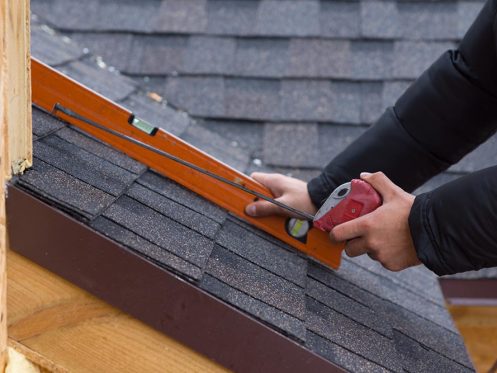If you’re planning to replace your roof or make decisions about a new building project, one of the most important considerations is the pitch of your roof. Roof pitch refers to the steepness or slope of your roof, and it’s usually expressed as a ratio. If you understand roof pitch and its importance, you’ll be better able to make the right decision for your home and its needs.
Why Roof Pitch is Important
The pitch of a roof can play an important role in how well it performs and how long it will last. It refers to the steepness or slope of the roof, and it’s measured in terms of vertical rise for every horizontal foot. The importance of roof pitch can’t be overstated, because it can directly impact a number of aspects related to your home.
The roof pitch will determine how well it will drain away rainwater. A steeper roof pitch will allow water to flow off the roof quickly, which can reduce the risk of water pooling or leakage. This is important in areas that experience a great deal of rainfall. The roof pitch can also affect your home’s energy efficiency. A properly pitched roof will allow for better insulation and ventilation, which can reduce the energy consumption that’s needed for heating and cooling. This can help you save on your energy bills.
A steeper roof will give you better support and load distribution, which makes it more resistant to strong winds. Different roof pitches can also complement the architecture of your home, which can add visual appeal to your home’s exterior.
How Architectural Style Can Affect Roof Pitch
The architectural style of your home can play an important role in determining what type of roof pitch is appropriate, because different styles have different roof designs that go well with the house’s overall aesthetic. Traditional architectural styles (such as Colonial or Victorian) will often have steeper roof pitches, because they have a more dramatic and visually appealing look. Modern architectural styles (like Minimalist or Contemporary) may have flatter roof pitches to accommodate a sleeker and more minimalistic design.
Roof Pitch and the Choice of Materials
Roof pitch can play a significant role in what type of materials can be installed, because it determines the slope or angle at which your roof will be constructed. Different roof materials will be suitable for different roof pitches, so choosing the right one will be important for your roof’s performance and longevity.
If your roof has a low slope (such as those with a pitch of 2:12 or less), using materials that offer a great deal of water resistance and durability will be the better choice. Some materials that are good for low-sloped roofs can include but may not be limited to:
- Modified bitumen.
- TPO.
- EPDM.
If your roof has a steep slope with a pitch that’s greater than 4:12, you’ll have a lot more choices in terms of roofing materials. Some of the common choices for these types of roofs include the following:
- Asphalt shingles.
- Metal roofing.
- Clay or concrete tiles.
- Slate.
As you make a decision about your roof materials, it’s important to take their specific requirements into careful consideration. It can be helpful to speak with a professional roofer to make sure you make a choice that will give you the best performance and protection for your home.
How Building Codes and Regulations Can Determine Roof Pitch
Building codes and regulations can play an important role in the type of roof pitch that can be used on your home. These codes are put in place to make sure the property on which the roof is installed will be safe and structurally sound, which is why complying with them is important for avoiding structural issues and legal complications.
Building codes usually specify a minimum slope required for different roofing materials. For areas that experience a great deal of rainfall, a steeper roof pitch may be required to make sure it has enough drainage (which can prevent water damage). Areas that experience a great deal of strong winds may have other roof pitch requirements to make sure they have more wind resistance.
If you’re looking for one of the best roofers in Corpus Christi, be sure to reach out to Bayfront Roofing. We have a team of experienced professionals who would be more than happy to answer any questions about attic ventilation, and they would be happy to speak with you about your specific roofing needs.
